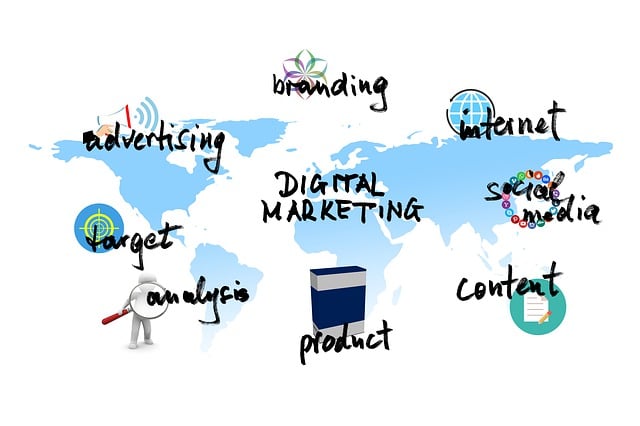Managed Service Providers (MSPs) can significantly amplify their marketing efforts by leveraging a strategic combination of social media platforms, analytics, AI technologies, and content integration. By utilizing tools like Hootsuite or Buffer for scheduling and analyzing content, MSPs can maintain a consistent online presence that resonates with their target audience. Incorporating AI-driven chatbots and advanced analytics tools allows for more personalized interactions and data-centric marketing decisions, leading to enhanced engagement and lead generation. A cohesive approach that integrates social media with other marketing channels like email marketing and SEO can create a robust digital marketing framework, driving organic traffic and establishing the MSP as an industry thought leader, thereby contributing to sustainable business growth in today's digital landscape.
exploring the dynamic landscape of digital marketing, this article delves into the transformative power of social media for Managed Service Providers (MSPs). We will dissect various case studies that exemplify MSP marketing excellence. From crafting strategic content to fostering community engagement and leveraging analytics, each section unravels a pivotal aspect of successful social media practices for MSPs. Join us as we explore how these technologies and strategies can elevate your business in the competitive digital arena.
- Leveraging Social Media for MSP Marketing: An Overview
- Case Study Analysis: MSPs That Mastered Social Media Engagement
- Strategic Content Creation: MSPs That Produced Impactful Campaigns
- The Role of Thought Leadership in MSP Social Media Success
- Community Building and Relationship Management for MSPs on Social Platforms
- Utilizing Social Media Analytics to Drive MSP Marketing Strategies
- Innovative Social Media Tools and Technologies for Efficient MSP Marketing
- Integrating Social Media with Other Marketing Channels: A Holistic Approach for MSPs
Leveraging Social Media for MSP Marketing: An Overview

In the realm of Managed Service Providers (MSPs), social media has transcended from a platform for engagement to a pivotal tool for marketing and business growth. Effective MSP marketing strategies hinge on the ability to craft compelling narratives that resonate with potential clients. By curating content that showcases expertise, solutions, and thought leadership, MSPs can establish themselves as authoritative figures within their industry on platforms like LinkedIn, Twitter, and Facebook. The key lies in consistently delivering valuable insights, engaging with peers and prospects through conversations, and leveraging social media analytics to tailor campaigns to the target audience’s preferences and behaviors. This not only enhances brand visibility but also fosters trust and credibility among existing and prospective clients, thereby driving business growth organically.
Furthermore, successful MSP marketing on social media involves a strategic approach that includes content calendar management, identifying key industry hashtags, and collaborating with influencers to expand reach. It’s crucial for MSPs to maintain a balance between promotional content and informative posts that provide genuine value. By staying abreast of the latest trends and adapting strategies accordingly, MSPs can effectively use social media to differentiate themselves from competitors, thereby capturing a larger market share and solidifying their position as industry leaders. Engaging with clients where they are most active not only opens channels for direct feedback but also offers a platform to demonstrate responsiveness and a deep understanding of the evolving IT landscape, which is integral to successful MSP marketing.
Case Study Analysis: MSPs That Mastered Social Media Engagement

MSPr Marketing has been a game-changer for numerous Managed Service Providers (MSPs) looking to enhance their online presence and engagement. A close examination of MSPs that have mastered social media reveals a common thread: a strategic approach to content creation, audience targeting, and interactive communication. For instance, an MSP that excelled in this domain consistently produced valuable content tailored to the needs and interests of their niche markets. They leveraged platforms like LinkedIn for B2B engagement, sharing insights on industry trends, and offering actionable advice that positioned them as thought leaders. Their Twitter feed was a bustling hub of real-time support tips, while their Facebook page hosted a community where clients could share experiences and solutions. This MSP’s efforts in MSP marketing through social media not only increased their brand visibility but also fostered trust and loyalty among their client base. By actively engaging with their audience, responding to comments, and participating in relevant conversations, they demonstrated a commitment to customer care that transcended mere service provision. Their success underscores the importance of a human-centric approach in MSP marketing strategies, where personalized interaction and genuine engagement are paramount.
Strategic Content Creation: MSPs That Produced Impactful Campaigns

In the realm of MSP marketing, strategic content creation stands out as a cornerstone for impactful campaigns. A prime example of an MSP that excelled in this area is CloudSwyft, which crafted a series of informative and engaging videos that addressed common IT challenges faced by small businesses. Their approach was to provide solutions through storytelling, positioning themselves not just as service providers but as thought leaders and trusted advisors. This strategy not only elevated their brand presence but also fostered a community around their content, leading to increased engagement and client trust. Another MSP that effectively leveraged strategic content creation is IT ServiceNow. They utilized a mix of formats, including blog posts, infographics, and whitepapers, to break down complex cybersecurity topics into digestible content that resonated with their target audience. By consistently delivering high-quality educational material, they established themselves as a go-to resource in the MSP space, driving both leads and customer loyalty. These case studies underscore the importance of a well-thought-out content strategy in MSP marketing efforts, highlighting how impactful campaigns can be achieved through valuable and targeted content creation.
The Role of Thought Leadership in MSP Social Media Success

In the realm of Managed Service Providers (MSPs), establishing thought leadership through social media is a pivotal component of successful MSP marketing strategies. By consistently sharing insightful content that addresses industry challenges and trends, MSPs can position themselves as authoritative figures within the tech community. Thought leadership content not only fosters trust among potential clients but also showcases the expertise and innovative solutions an MSP offers. This positions them as go-to partners for businesses seeking expert guidance and proactive IT support. Engaging on platforms like LinkedIn, Twitter, and Facebook, MSPs can leverage their knowledge to engage with a broader audience, thereby increasing their visibility and credibility. The strategic use of these platforms allows for direct interaction with both current and prospective clients, providing a space for real-time feedback and the opportunity to demonstrate a deep understanding of the industry’s complexities. By doing so, MSPs can effectively differentiate themselves from competitors and solidify their standing as leaders in their field through MSP marketing efforts.
Furthermore, thought leadership is not just about sharing knowledge but also about creating conversations that resonate with the target audience. It involves crafting content that highlights case studies, best practices, and innovative strategies in MSP marketing. By showcasing real-world examples of how their services have positively impacted businesses, MSPs can illustrate the tangible benefits of their offerings. This narrative not only attracts attention but also encourages engagement, as peers and clients alike can relate to success stories and see potential solutions for their own challenges. Through this approach, MSPs can effectively build a community around their brand, fostering relationships that lead to long-term client retention and organic growth driven by MSP marketing initiatives.
Community Building and Relationship Management for MSPs on Social Platforms

In the realm of MSP marketing, community building and relationship management on social platforms are pivotal for establishing a brand’s presence and fostering engagement. MSPs can leverage these platforms to create a space where clients feel valued and heard. By consistently delivering valuable content tailored to their audience’s interests and needs, MSPs can nurture relationships that extend beyond transactional interactions. Engaging with users through comments, messages, and direct interactions not only humanizes the brand but also positions the MSP as a thought leader within the industry. Social listening tools enable MSPs to track conversations around their services, allowing them to address concerns promptly and contribute meaningfully to discussions. This active presence in the community demonstrates a commitment to client satisfaction and ongoing support, which is crucial for building trust and loyalty.
Moreover, successful MSP marketing strategies on social media involve relationship management that goes beyond reacting to direct interactions. It encompasses understanding the broader market dynamics, such as emerging trends and customer pain points. By curating content that resonates with their audience’s challenges and successes, MSPs can position themselves as reliable partners. Additionally, by showcasing case studies and testimonials, these businesses can provide tangible evidence of their expertise and effectiveness, further solidifying their position within the community. The integration of social media analytics tools allows for the measurement of engagement levels, providing insights into what content drives interaction and facilitates refinement of strategies for more effective MSP marketing efforts.
Utilizing Social Media Analytics to Drive MSP Marketing Strategies

In the realm of managed service providers (MSPs), leveraging social media analytics is pivotal in crafting effective marketing strategies. By meticulously analyzing engagement metrics, MSPs can gain insights into what content resonates with their audience, thereby tailoring their messaging to align with the interests and needs of potential clients. These analytics offer a data-driven approach to understanding the demographics and behaviors of the target market, enabling MSPs to refine their marketing efforts for greater impact. This includes optimizing post timings, content types, and even the tone of communication to better engage with prospects. By monitoring key performance indicators such as likes, shares, comments, and click-through rates, MSPs can create more compelling campaigns that not only increase visibility but also establish thought leadership in the tech community. This iterative process ensures that marketing initiatives are not only based on intuition but are grounded in empirical evidence gathered from social media platforms, thus driving more successful outcomes for MSPs looking to expand their client base and enhance their online presence.
Furthermore, integrating these analytics into the broader MSP marketing strategy allows for a more nuanced approach to audience segmentation. By identifying patterns and preferences within different segments, MSPs can tailor content to address specific challenges or interests, thereby personalizing the user experience and fostering stronger client relationships. This targeted approach, informed by real-time data, ensures that marketing efforts are not only relevant but also resonate with the intended audience. In doing so, MSPs can elevate their brand presence on social media, positioning themselves as go-to experts in the industry, and ultimately driving more meaningful business results through strategic, analytics-informed marketing initiatives.
Innovative Social Media Tools and Technologies for Efficient MSP Marketing

In the realm of Managed Service Providers (MSPs), leveraging innovative social media tools and technologies is paramount for effective marketing. MSPs can utilize a suite of advanced platforms that facilitate content scheduling, audience segmentation, and real-time analytics to tailor their campaigns to specific demographics. Tools like Hootsuite or Buffer streamline content management across various social networks, allowing MSPs to maintain a consistent brand presence without the time-intensive process of manual posting. Additionally, these tools offer insights into engagement metrics, helping MSPs understand which types of content resonate most with their audience and optimize their strategies accordingly.
Moreover, the integration of artificial intelligence (AI) in social media marketing can significantly enhance MSP marketing efforts. AI-driven chatbots can engage potential clients in real-time conversations, providing instant responses to queries and nurturing leads through the sales funnel. The use of AI-powered analytics tools, such as Google Analytics or Tableau, enables MSPs to track customer behavior across social platforms, leading to data-driven marketing decisions that improve campaign performance. By adopting these cutting-edge technologies, MSPs can elevate their social media presence, foster meaningful connections with their audience, and ultimately drive business growth in a competitive digital landscape.
Integrating Social Media with Other Marketing Channels: A Holistic Approach for MSPs

In the realm of managed service providers (MSPs), integrating social media with other marketing channels is a pivotal strategy for fostering growth and engagement. A holistic approach to MSP marketing involves leveraging the strengths of each channel to complement and amplify the overall message. Social media platforms offer a dynamic space for MSPs to showcase their expertise, engage with their audience, and build brand awareness. By curating content that resonates with their target demographic, MSPs can drive traffic to their websites and convert social media interactions into meaningful leads. The integration of social media with email marketing, for instance, allows for the nurturing of leads through personalized communication, while also reinforcing the MSP’s online presence. Similarly, linking social media efforts with search engine optimization (SEO) can enhance content visibility and drive organic traffic, thereby creating a cohesive and comprehensive digital marketing ecosystem. This multifaceted approach not only broadens the reach of an MSP’s messaging but also ensures that each marketing channel informs and enriches the others, leading to a more effective and impactful campaign.
To effectively integrate social media with other marketing channels, MSPs should adopt a strategic mindset that emphasizes consistency in messaging, branding, and audience engagement across all platforms. By aligning their social media efforts with their content marketing strategy, MSPs can ensure that the content shared is not only relevant but also valuable to their audience. This integration extends beyond mere cross-posting; it involves tailoring content to fit each platform’s unique user base while maintaining a unified voice that reflects the MSP’s brand identity and values. By doing so, MSPs can create a more immersive experience for their audience, fostering deeper connections and building trust, which are critical components of successful MSP marketing strategies.
In reviewing the landscape of MSP marketing, it’s evident that social media serves as a dynamic platform for growth and engagement. The case studies highlighted demonstrate the transformative power of strategic content creation, thought leadership, and community building within this realm. By leveraging analytics and innovative tools, MSPs can refine their approach to social media, ensuring their marketing efforts are not only impactful but also aligned with their audience’s needs. Integrating these strategies with other marketing channels leads to a comprehensive approach that can elevate an MSP’s presence and success online. As the industry continues to evolve, staying abreast of the latest trends and technologies in social media marketing will remain crucial for MSPs aiming to stay ahead in this competitive space.
